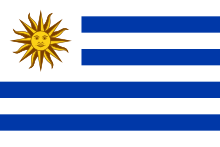
Uruguay, officially the Oriental Republic of Uruguay, is a country in South America. It shares borders with Argentina to its west and southwest and Brazil to its north and northeast, while bordering the Río de la Plata to the south and the Atlantic Ocean to the southeast. It is part of the Southern Cone region of South America. Uruguay covers an area of approximately 176,215 square kilometres (68,037 sq mi). It has a population of around 3.4 million, of whom nearly 2 million live in the metropolitan area of its capital and largest city, Montevideo.

Montevideo is the capital and largest city of Uruguay. According to the 2011 census, the city proper has a population of 1,319,108 in an area of 201 square kilometers (78 sq mi). Montevideo is situated on the southern coast of the country, on the northeastern bank of the Río de la Plata.
Japanese Uruguayans are Uruguayan citizens of Japanese descent.

Paraguay and Uruguay established diplomatic relations on April 6, 1845. Paraguay has an embassy and a consulate-general in Montevideo. Uruguay has an embassy and a consulate-general in Asunción. Paraguay also has an honorary consulate in Punta del Este. Both countries were founding members of the Mercosur, and both are full members of the Rio Group, the Latin Union, the Association of Spanish Language Academies, the Organization of American States, the Organization of Ibero-American States, the Union of South American Nations, the URUPABOL, the Cairns Group and the Group of 77.

There is a significant Argentine diaspora in Mexico. According to the 2010 census, there were 13,696 registered Argentine citizens living in Mexico, an increase from the 6,465 registered in the 2000 census. Argentine immigrants constitute the second largest community of South Americans in Mexico and the fifth largest immigrant community overall.

The history of the Jews in Uruguay dates back to the colonial empire. The most important influx of Jewish population occurred during the end of the 19th century and the first half of the 20th century, mainly during the World War II.

The German community in Uruguay numbers ca. 10,000 German expatriates and 300,000 people of German descent. Most of them live in the Montevideo area, although there are German minorities in Paysandú, Río Negro, San José and Canelones.

Colegio y Liceo Alemán de Montevideo. is one of the most prestigious schools in Uruguay. It was established in 1857 for the children of German traders, artists, engineers and diplomats living in Montevideo.
Peruvian Uruguayans are mostly Peruvian-born persons living in Uruguay. There are as well some Uruguayan-born persons of partially or full Peruvian descent.

A Uruguayan Argentine is an Argentine citizen of Uruguayan descent or a Uruguay-born person who resides in Argentina. As of 2012, there were over 116,000 Uruguayans living in Argentine territory.

Argentine Uruguayans are people born in Argentina who live in Uruguay. In 2010, there were over 10,000 Argentines living in Uruguayan territory.

Brazilian Uruguayans are people born in Brazil who live in Uruguay, or Uruguayan-born people of Brazilian descent.
Uruguayans in Spain are people born in Uruguay who emigrated to Spain. As of 2022, there are over 80,000 Uruguayans living in Spain, mostly in Catalonia.

Emigration from Uruguay is a migratory phenomenon that has been taking place in Uruguay since the early 20th century.
Uruguayan Venezuelans are people born in Uruguay who live in Venezuela, or Venezuelan-born people of Uruguayan descent. Modern estimates put the figure of Uruguayans in Venezuela at ca. 9,000.
Uruguayan Chileans are people born in Uruguay who live in Chile, or Chilean-born people of Uruguayan descent.
Uruguayans in Sweden are people born in Uruguay who live in Sweden, or Swedish-born people of Uruguayan descent. As of 2013, there were over 4,000 Uruguayans living in Swedish territory.

There is a small Chilean diaspora in Mexico. According to the 2010 census, there were 5267 registered Chilean citizens living in Mexico, an increase from the 3,848 registered in the 2000 census. Chilean immigrants constitute the fifth largest community of South Americans in Mexico and the fifteenth largest immigrant community overall.
Venezuelan Uruguayans are people born in Venezuela who live in Uruguay, or Uruguayan-born people of Venezuelan descent.
Austrian Uruguayans are people born in Austria who live in Uruguay or Uruguayan-born people of Austrian descent.












